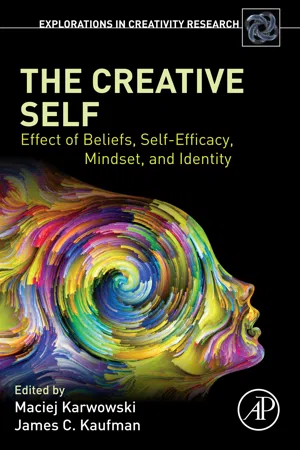
The Creative Self
Effect of Beliefs, Self-Efficacy, Mindset, and Identity
- 418 pages
- English
- ePUB (mobile friendly)
- Available on iOS & Android
The Creative Self
Effect of Beliefs, Self-Efficacy, Mindset, and Identity
About this book
The Creative Self reviews and summarizes key theories, studies, and new ideas about the role and significance self-beliefs play in one's creativity. It untangles the interrelated constructs of creative self-efficacy, creative metacognition, creative identity, and creative self-concept. It explores how and when creative self-beliefs are formed as well as how creative self-beliefs can be strengthened. Part I discusses how creativity plays a part in one's self-identity and its relationship with free will and efficacy. Part II discusses creativity present in day-to-day life across the lifespan. Part III highlights the intersection of the creative self with other variables such as mindset, domains, the brain, and individual differences. Part IV explores methodology and culture in relation to creativity. Part V, discusses additional constructs or theories that offer promise for future research on creativity.- Explores how beliefs about one's creativity are part of one's identity- Investigates the development of self-beliefs about creativity- Identifies external and personality factors influencing self-beliefs about creativity- Incorporates worldwide research with cross-disciplinary contributors
Tools to learn more effectively

Saving Books

Keyword Search

Annotating Text

Listen to it instead
Information
Toward Untangling Creative Self-Beliefs
* University of Connecticut, Storrs, CT, United States
** The Maria Grzegorzewska University, Warsaw, Poland
Abstract
Keywords
Table of contents
- Cover
- Title page
- Table of Contents
- Copyright
- Dedication
- List of Contributors
- Acknowledgments
- The Nuances and Complexities of Who We Are When We Create: An Introduction to Creativity and the Self
- Part I: Broad considerations
- Part II: Living a creative life
- Part III: Integrating multiple constructs
- Part IV: Specific considerations
- Part V: New models and perspectives
- Index
Frequently asked questions
- Essential is ideal for learners and professionals who enjoy exploring a wide range of subjects. Access the Essential Library with 800,000+ trusted titles and best-sellers across business, personal growth, and the humanities. Includes unlimited reading time and Standard Read Aloud voice.
- Complete: Perfect for advanced learners and researchers needing full, unrestricted access. Unlock 1.4M+ books across hundreds of subjects, including academic and specialized titles. The Complete Plan also includes advanced features like Premium Read Aloud and Research Assistant.
Please note we cannot support devices running on iOS 13 and Android 7 or earlier. Learn more about using the app